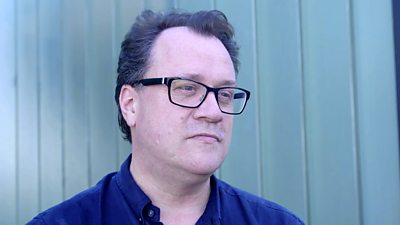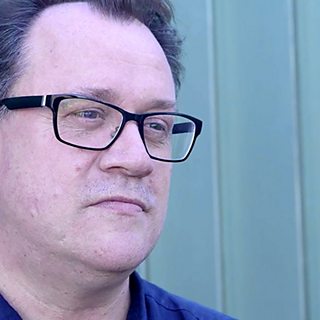Ahead of �鶹������ҳ��� Writersroom's launch in Wales with a one day festival on 24th March 2017, we caught up with the great Welsh writer Russell T Davies (Doctor Who, Years & Years, A Very English Scandal, Queer as Folk, Torchwood, The Grand, Bob & Rose, Casanova, Cucumber, Banana) from our 2016 TV Drama Writers' Festival. It's packed with great advice for other writers...
What’s the best piece of advice about writing you’ve ever been given?
The best piece of advice I’ve ever had about writing was essentially not to be so serious. You can be talking about the most serious thing in the world but people aren’t necessarily serious all day long. You can be at a funeral and have a laugh, you can be discussing the worse topics in the world and a sense of humour will rise up. When I was younger someone said to me ‘why don’t you write like you talk?’ because I do have a bit of a laugh when I talk. That was a great piece of advice.
And what was the worst?
The worst piece of advice I think was that old classic ‘kill your children’, they always say that to writers ‘kill your children’ which means get rid of your favourite lines. Who kills their children? What a stupid piece of advice! Murderers do that. If you’ve got a favourite line it’s probably brilliant. Do the opposite, cling to those lines at the expense of any other line.

What advice would you give to a writer who wants to step up to being a showrunner?
The best advice is to learn your trade and basically don’t be nuts! A lot of writers can be temperamental, a lot of people become writers because they live in their own world, they type in their bedroom or in their attic, they can be very anti-social creatures, living in their own imagination. That’s fine, that makes a great writer, but once you set foot on a TV or film set all that’s gone out of the window, then you’ve got to be professional and sensible, focussed and precise in what you do. You have to learn to do the job by being on set, you’ve got to be with actors, you’ve got to be with designers, you’ve got to be with directors. You also have to ask for that opportunity as not all producers will give it to you automatically, in fact there are some producers that fight against it, so you and your agent and your behaviour have got to allow it. It’s worth fighting for, it’s the one thing that will get you somewhere and make you not necessarily a showrunner, but at least a producer on your own work.
If there was one thing in the UK TV industry that you could get rid of what would it be?
In terms of drama I think every soap should cut themselves down to 3 episodes a week – no one is planning for 20 years time in soap operas. They are watching their viewing figures go from 6 million to 5 million to 4 million – 2 or 3 million is in sight now – you’ve got to look at where we’ll be in 20 years time. You should go 3 times a week with each of them – 3 great episodes a week – fill those other 2 spaces a week with new sitcoms, stuff that makes us laugh! Get teams of writers writing different shows in those slots. Just vary it across the week because not varying it isn’t working.
What’s the most common error you see made by new writers?
The most constant, profound error that I see in script after script after script is not to write the story. What I mean is (and I can’t go into too much detail as I don’t want to name specific scripts) but for example I'll get sent a script which is about a nursery school – a drama series about a nursery school – and you’ll find for example that the script will have given one of the nursery school teachers a really interesting mother who is in trouble with the law and whose kitchen needs to be rebuilt. You’ll find that they’ve written about everything except the nursery school. There’s a nursery school there, it’s in the script but the story is all about something else.
I recently read a script about a couple, they should have been a fascinating couple but the script was about everything except the couple. They all had funny mums and daft dads and funny things happened and eccentric things and dramatic things but the central couple were a blank. It’s amazing how often that happens – someone will say their script is about ABC and they actually write a script about XY and Z. If you promise a script about nurses and the script is actually about a house share then the house share drama may be good but it isn’t about nurses. Make it a drama about a house share or make it a series about nurses but write the story you’ve promised us you’re going to write. Lots of writers will fill in the margins - they have a wandering eye – but you must keep the focus on the centre of your script, on the central people of your script and on the central story that you want to tell.
The other thing that people get wrong is that they think of themselves as a character writer or a plot writer. "Character writers" sit back as if they don’t need to invent a plot – and use examples like or or and describe it as ‘just observational comedy’, just characters chatting in living rooms or pubs. It’s not. I watched an episode of The Royle Family the other day and it’s full of plot – it was the episode where Antony wants to go to London and it was a brutal examination of a family bullying its youngest child into conforming and not getting ideas above his station. It was story, story, story.
There’s no such thing as simply writing character. If you say you’re a character writer and you just write character what you’re actually writing is a pub bore! If you’re just a character writer you are writing boring people. Story and character are indivisible, they are the same thing and you only discover a character when they’ve got a story to go through.
US TV versus UK TV in a boxing match, who wins?
It’s a draw. They’ve got great stuff, we’ve got great stuff, they’ve got rubbish we’ve got rubbish it’s as simple as that. There’s nothing on US TV that can touch the skin of , equally if you’re watching at its finest we can’t produce a thriller like that and we’re not producing a thriller like that. It’s a great competition!
Read a Doctor Who script by Russell T Davies in our online script library
